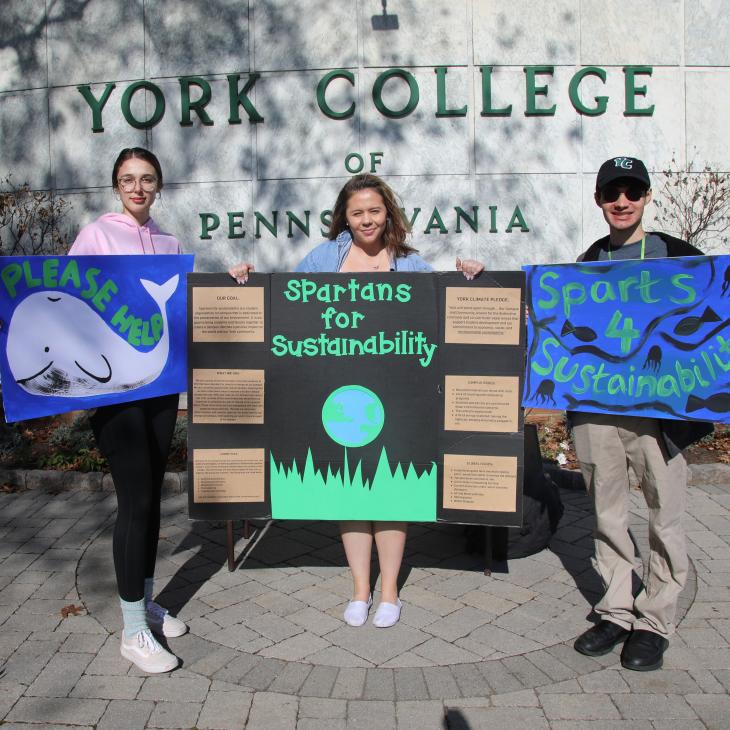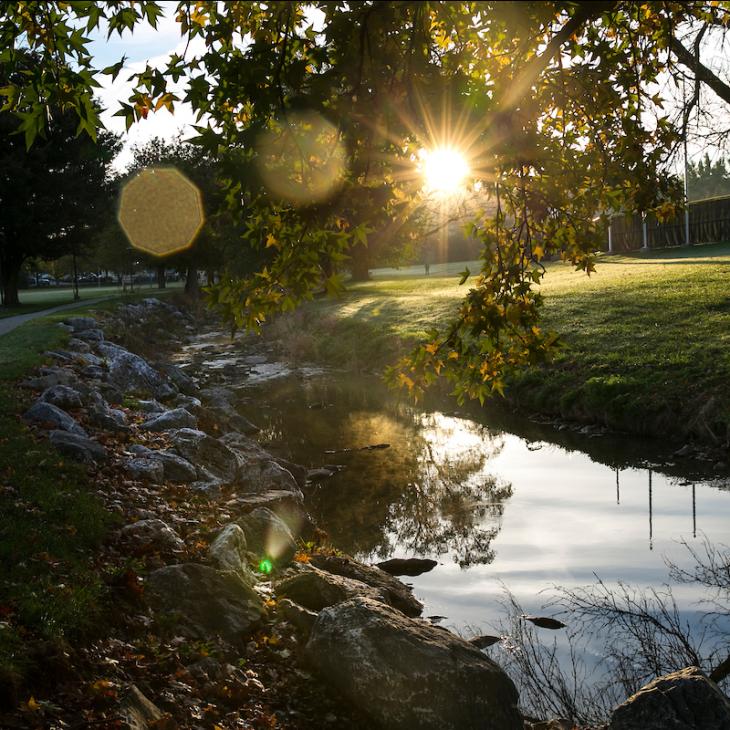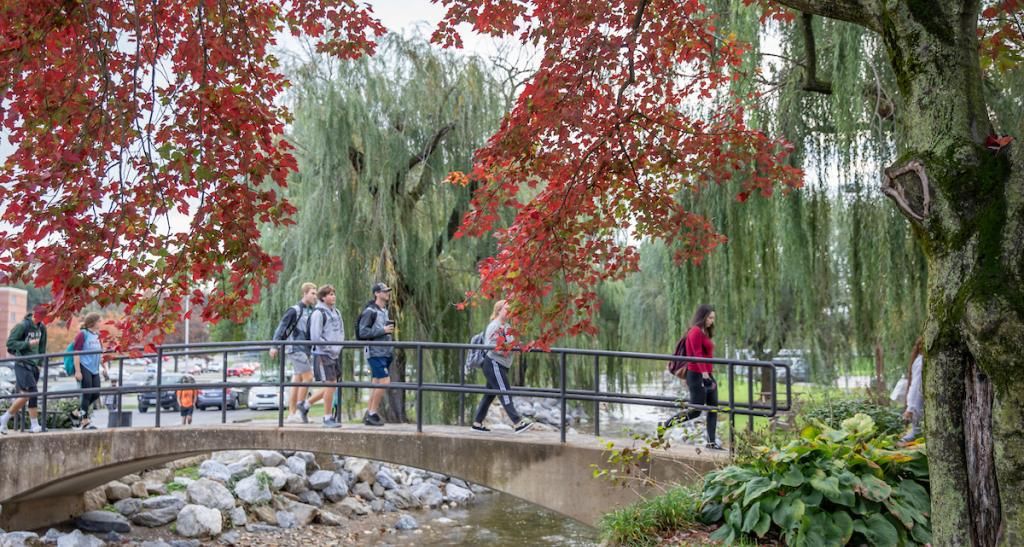
Spartans for sustainability.
The President's Task Force for Campus Sustainability (PTFCS) was established in December 2019 by the College's fourth president, Dr. Pamela Gunter-Smith. The PTFCS is charged with: "coordinat[ing] activities and mak[ing] recommendations from the various groups" and to "not only position the College to join other institutions in signing the American College & University Presidents' Climate Leadership Commitments, but also to take action and monitor progress."
Statewide Achievements
Joined PERC (Pennsylvania Environment Resource Consortium) becoming a member of it since November 1, 2020.
Nationwide Achievements Currently gathering comprehensive sustainability data and information for AASHE's (Association for the Advancement of Sustainability in Higher Education) STARS Report (The Sustainability Tracking, Assessment & Rating System).
SIMAP (Sustainability Indicator Management & Analysis Platform) is a campus calculator tool to collect carbon footprint and nitrogen emissions. The Task Force is currently working with various offices collecting data to establish the YCP baseline. 2020.
About the Task Force
The following academic programs are designed to educate York College students in areas directly related to environmental sustainability. Students in these programs often contribute to hands-on sustainability projects in our local community, collaborating with small businesses and organizations to create lasting change.
- Data collection for YCP's first-ever Carbon Footprint
- Initial research to create a commuter survey for students, staff, and faculty
- Data collection from the Student Sustainability Knowledge Assessment
- Data collection and analysis from the YCP Sustainability Assessment
- Clothing Swap event ran by Student Senate and the Office of Sustainability
The Office of Sustainability has created two surveys to help gain an understanding of the current culture of sustainability at YCP.
The first survey asks students, staff, and faculty to share their opinions on the current state of YCP's sustainability efforts. Additionally, the survey will ask what specific programs or initiatives students, staff, and faculty would like to see YCP conduct regarding campus sustainability. The results of this survey will have a direct impact on the decision-making of YCP. The link to the survey is below!
The second survey is ONLY FOR STUDENTS! This survey is a knowledge assessment for current students, the purpose of this survey is to understand the collective level of sustainability knowledge of the student. The link to the survey is below.
- Chemistry Society
- Biology Club
- Student Senate – Sustainability Ad Hoc Sub-Committee
- Plant and Gardening Club
- Beekeeping Club
- Scout Club
York College's Center for Community Engagement (CCE) is dedicated to enhancing the quality of life in York County. Housed in downtown York, the CCE engages in a number of projects and initiatives within the local community.
Robbie Bacon, Director of Residence Life
Vinny Cannizzaro, Director of the Glatfelter Institute
Perri Druen, Faculty of Psychology
Kevin Fell, Director of Facility Services
Abigail Foxwell, Alum Representative
Greg Foy, Faculty of Chemistry
Nick Gaito, Student Representative
Sara Goodwin, Assistant Dean of Student Affairs and New Student Programs
Karl Kleiner, Faculty of Biology
Rory Kraft, Faculty of the Arts and Humanities
Aeryn McClain, Student Senate
Tahera Naznin, Faculty of Horticulture
*Jennifer Pomeroy (Chair), Faculty of Geography, Dept. of History & Political Science
Debra Staley, Staff Representative, Dept. of History & Political Science
Calvin Stein, Student Representative
Mikayla Trost, Vice Chair of York College IEEE Student Branch
Dylan Wagner, President of Biology Club
Josh Wyrick, Faculty of Civil and Mechanical Engineering

Ideas and Suggestions
Do you have an idea about how we can make York College a more sustainable campus? Let us know, and we'll bring it to the attention of the committee.
Sustainability Events
Cultural Series Sustainability Events
- September 13, 2023, 7 p.m. - Sustainability, Recovery, and the Ruined Gardens of Ithilien in Tolkien’s Middle-earth
- J.R.R. Tolkien’s characters like Tom Bombadil, Radagast the Brown, hobbits, and the sentient tree-beings display living in keeping with nature.
- Join us as we discover what we can learn about the environment from looking at Tolkien.
- Jonathan Evans is a professor of medieval languages and literature at the University of Georgia.
- Location: Weinstock Lecture Hall, Willman Business Center
- October 5, 2023, 7 p.m. - Wood, Film
- Every year 20 million cubic meters of timber are illegally harvested from the forests of Romania. But where do the trees end up, and who is making the money? Wood follows undercover operations from Europe to Asia and South America as we follow the money. A discussion will follow the film.
- Humanities Center 218
Cultural Series Sustainability Events - Every third Wednesday evening at 7 p.m.
- March 14, Wednesday, 7-9 p.m. - Environmental Racism
- Often overlooked in discussions of the importance of environmental change is the role that race plays.
- In the placement of industrial “parks” or the prioritization of specific citizen-level sustainability programs to areas with higher incomes, we see time and again the ways that environmental “greening” programs leave behind–or actively harm–communities that are primarily non-white.
- Betz is an Assistant Teaching Professor at Rutgers-Camden.
- Location-Weinstock Lecture Hall, Willman Business Center
- April 11, Wednesday, 7-8 p.m. - Thirteen Ways, Film
- This film explores the human relationship to the natural world through an experimental structure: a series of scientists, hunters, paragliders, artists, and naturalists travel to a plot of Maine land they have never seen before.
- One-by-one, through all four seasons, they walk the land and describe what they see. What unfolds is an unusual meditation upon the human relationship to the natural world and the power of different ways of seeing. A discussion will follow the film.
- Location-Humanities Center 218


